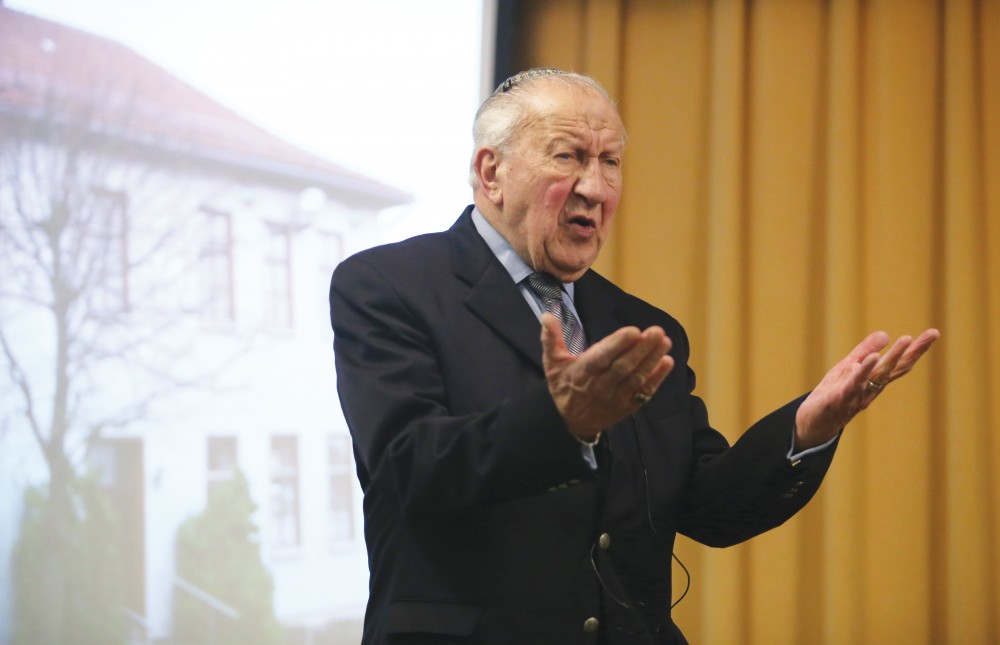GV to hold Holocaust conference

Oct 9, 2014
Forty years ago, members of the history department at Grand Valley State University came together to create the Great Lakes History Conference. Each year the conference highlights different global issues and addresses them through various presentations and speakers.
This year, professors and students from around the country will come together to raise awareness on the Holocaust and global genocides.
“From year to year it is a different topic and different theme,” said GVSU history professor Douglas Montagna. “We thought it was timely considering events in the world.”
Montagna, with fellow history professor Gordon Andrews, led a team in organizing this conference, which is being held Oct. 10 and 11 on the GVSU Pew Campus.
This year, the world will recognize the 100-year anniversary of World War I. This anniversary, along with the many travesties occurring globally, made the relevance of this topic even greater.
“The word genocide itself essentially has come to signify the systematic killing of people – whether it be on the basis of ethnicity, religion, even social status (or) political opinion,” said GVSU history professor Yosay Wangdi.
The relevance of the topic wasn’t the only reason the theme was selected.
“We were also able to get a very distinguished speaker on the topic,” Montagna said. “One of our professors knew Jon Gross, who is a world renowned scholar on the Holocaust, and we figured accommodation of reason was a good enough reason.”
Gross is a professor of European history at Princeton University and one of the conference’s keynote speakers. The other keynote speaker is Stephen Feinberg, former special assistant for educational programs at the United States Holocaust Memorial.
Feinberg speaks Oct. 10 at 7:30 p.m. in the Loosemore Auditorium located in the Richard M. Devos Center. His presentation entitled “Pedagogical Issues and Concerns When Teaching About the Holocaust” will also include a discussion.
Gross is the keynote speaker on Oct. 11. Gross will also address the Holocaust in his presentation “On the Periphery of the Holocaust: Pillage and Killings of Jews by their Neighbors.” The presentation begins at noon on the second floor of the L.V. Eberhard Center.
“This conference essentially is for scholars. It gives scholars a platform to present their research and discuss their research,” said Wangdi, who will be presenting her research on Tibetan injustice in China. “It is mostly scholars from this Midwest area, but at large the United States and scholars from overseas as well coming here.”
Although some presentations are free and open to the public, registration to attend the multitude of panels during the conference is required. The cost is $40 for out-of-state attendees and $20 for West Michigan attendees. Registration is open from 8 a.m. to 9 a.m. on Oct. 10, and 8 a.m. to 9:15 a.m. on Oct. 11.
“A conference of this nature is really for the scholarship world, but it is also for the public,” Wangdi said. “It invites the public to attend these panels so it bridges the divide between the university and the public.”
Although anyone is able to attend the sessions, the conference is designed as an educational resource for students.
“It is great opportunity for students, especially for students interested in teaching,” Montagna said. “Students can learn a lot. There are so many different classes and sessions students can certainly find something of interest to them, and it’ll help them understand the world.”
Attendees will be able to learn not only about global genocides and the Holocaust, but also will be able to ask questions, give feedback and learn how to teach the topics.
“(Attendees) will learn something that they can’t get anywhere else,” Montagna said. “Nowhere else on two evenings in the area, maybe even anywhere in country, will there be so many experts on the Holocaust presenting and the larger topic of genocide and world history.”
Speakers include not only college professors, but the university also invited high school teachers, students, museum coordinators and other professionals. All together there will be 25 panels and two keynote speakers.
Although it is only a two-day event, the organizers hope attendees will apply the lessons to current events in the world.
“These issues, these horrible tragedies, continue around the world for people,” Montagna said. “We continue to kill each other in large numbers for reasons that are hard to fathom, and we are struggling to understand it and hopefully we can prevent it.”
For more information on the conference visit
www.gvsu.edu/history.





















